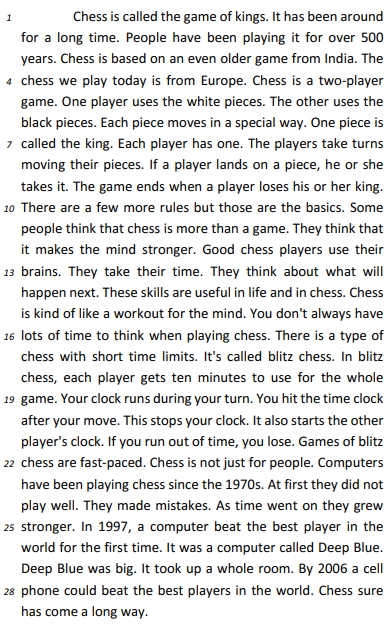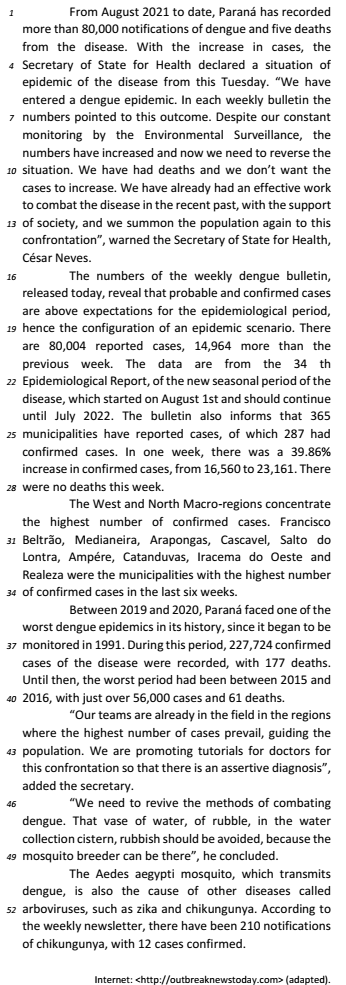Questões de Inglês - Presente simples | Simple present para Concurso
Foram encontradas 242 questões
( ) The underlined word in “… it helps to know more about hot air balloons themselves.“ is a relative pronoun.
( ) The preposition in the following sentence “…keeping the balloon floating above the ground.” means that the balloon is floating over the ground.
( ) The words ‘actually’, ‘push’, and ‘major’ mean in Portuguese: ‘atualmente’, puxar’ and ‘maior’.
( ) The negative form of “A hot air balloon has three major parts: the basket, the burner, and the envelope.” is “A hot balloon doesn’t have three major parts: the basket, the burner, and the envelope.”
( ) The tense used in the question “Have you ever wondered what keeps a hot air balloon flying?”, is an example of Past Perfect.
Choose the alternative which presents the correct sequence, from top to bottom.
“I met Mary and some Other friends for lunch and gave her the earrings. Mary thought They were great. Mary’s brother, John, take a lot of photographs. He has a car and he drove us to the beach. We built a big castle with sand from the beach, and we swam in the ocean. Fantastic!”

Internet: <www.nortechplus.com>.
Read the following text and answer question.
Importance of Aquaculture
Aquaculture involves the art, science and business of breeding aquatic animals and plants in fresh or
marine waters for human use. It also extends to the marketing of such organisms in a controlled environment. It is a kind of agriculture, and therefore, it requires inputs such as clean water and nutrients.
It also requires storage for harvested produce, transportation and marketing facilities.
Inputs often depend on the species that are farmed. Species lower on the aquatic food chain usually require less input, as they feed on microorganisms and are fine in just clean water. More inputs like fish or fishmeal, cereals, or grains are required, as we get higher on the food chain with species like salmon or tuna.
All over the world, the demand for seafood has increased because people have learned that seafood as part of regular diets are healthier and help fight cardiovascular disease, cancer, Alzheimer’s and many other major illnesses.
Aquaculture will add to wild seafood, and make it _______ and accessible to all.
Aquaculture business provides tax and royalty revenue to local governments. Besides, there is also potential revenue from exports.
(Adapted from: https://goo.gl/qcbcfY. Access: 01/25/2018)
Text for the items from.

Judge the items from.
There are examples of the present simple and present
perfect in the following sentence: “The bulletin also
informs that 365 municipalities have reported cases, of
which 287 had confirmed cases” (lines from 24 to 26).
“At the start of the 20th century, a new city was beginning to grow on some flat land near the sea in southern California; its name was Los Angeles - the name of the old Spanish mission that had been there for many years. At the same time, a new industry was just being born; the cinema. In America, they talked of "motion pictures", but this soon became shortened to "movies".”
(https://linguapress.com/intermediate/hollywoodworld.htm)
Assinale a alternativa que apresenta o tempo verbal do termo em destaque.
“Rat in the Parliament Something very unusual happens in the Spanish Parliament last week. Marta Bosquet is giving a speech. A speech means that she is talking to other politicians. They are listening to her. Then Bosquet stops talking. She looks at the floor. A rat is there. Some people run away. Some people take their feet off the floor. Other people look at the rat. People can watch the incident on TV. They do not see the rat. Nobody knows how big the rat really is. The situation calms down later. Politicians return to their seats. They start working again.”
(https://www.newsinlevels.com/products/rat-in-the-parliament-level-1/)
Assinale a alternativa que apresenta o tempo verbal que predomina o texto acima.
I. He teaches Spanish at the university.
II. She always kisse her grandma before leaving.
III. You don't arrive late. IV. She don't watch TV every day.
Check the alternative that presents correct statements.

For question, choose the correct answer.
Mary ______ in Liverpool for five years, but now she
________ in Edinburgh since March.
For question, choose the correct answer.
“What time ____ the class ______?”
The Pros and Cons of Nuclear Power
Since the disaster at the Fukushima nuclear power plant in Japan in 2011, a debate has been raging (1) the future of atomic energy. Consequently, the safety risks have been well publicized in the global media. But do the risks outweigh the damage that could be done to the planet because of our ongoing addiction to fossil fuels?
Even environmentalists don’t have the answer. They are split over nuclear (2) , and its pros and cons. Some say it is neither safe nor economical because it produces potentially (3) radioactive waste, and reactors are so costly to build. However, others believe nuclear energy is a necessary evil. They say we should continue using it until (4) energy sources, like wind turbines and solar panels, can meet global demand. Supporters also argue that nuclear energy helps cut down on carbon emissions from fossil fuels such as coal and natural gas, which are linked to global warming and pollute the environment. They say this is because nuclear reactors produce a tiny fraction of the carbon dioxide generated by burning coal.
But perhaps the biggest hurdle for atomic energy to overcome is its image problem. Despite industry claims of a strong safety record, critics remain unconvinced because each reactor annually produces up to 30 tons of nuclear waste, which can continue to be radioactive and hazardous for thousands of years. Furthermore, the Chernobyl disaster in 1986 left the public with vivid images of the impact of a nuclear meltdown, including deformed babies, mutated vegetables, and abandoned towns.
While nuclear reactors may continue to be installed in some countries for decades to come, after Fukushima others have decided to rethink their energy policies. For example, the German government has revealed plans for a “green” renewable energy plan, even though it has relied on nuclear power for up to 23 percent of its consumption in the past. It has been announced that all seventeen nuclear power plants would be phased out by 2022. The policy will also promote energy-saving measures encouraging people to insulate their homes, recycle, and reduce waste. Experts argue it could be a risky strategy because Germany doesn’t have natural gas or oil supplies, and coal supplies have been depleted.
Meanwhile, in Brazil, there is just one nuclear plant at Angra dos Reis. Nuclear power represents only three per cent of Brazil’s energy production. After sharp oil price rises in the 1970s, the country’s leaders anticipated future energy supply problems. So they concentrated on developing alternative energy sources including biofuel, hydroelectric schemes, and wind power.
This approach seems to be working because by May
2012 plans to build more nuclear reactors were shelved by Brazilian officials. The move was welcomed
by environmental lobby groups, which had feared a
potential ecological catastrophe in case of an accident. If a big country like Brazil, which is the tenth
largest energy consumer in the world, can survive and
improve its economy without much nuclear power,
maybe others can do so, too.
1. ‘…a machine has broken…’ is written in the present perfect tense. 2. The negative form of: ‘a machine has broken...’, is: ‘…a machine doesn’t have broken …’ 3. The words in bold in ”… clearly, little is getting through.” and “…more workers trying to keep pace with production…” are in the present progressive tense. 4. The negative form of “…and the remedy follows easily.” is “and the remedy doesn’t follow easily.”
Choose the alternative which presents the correct ones.